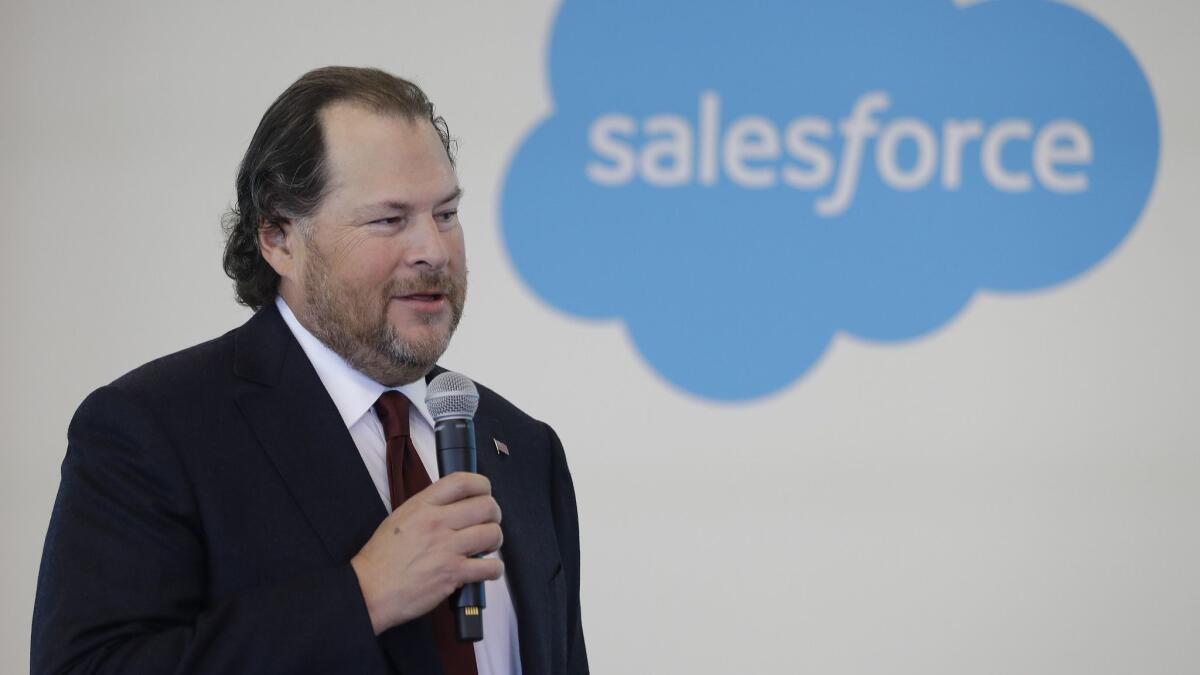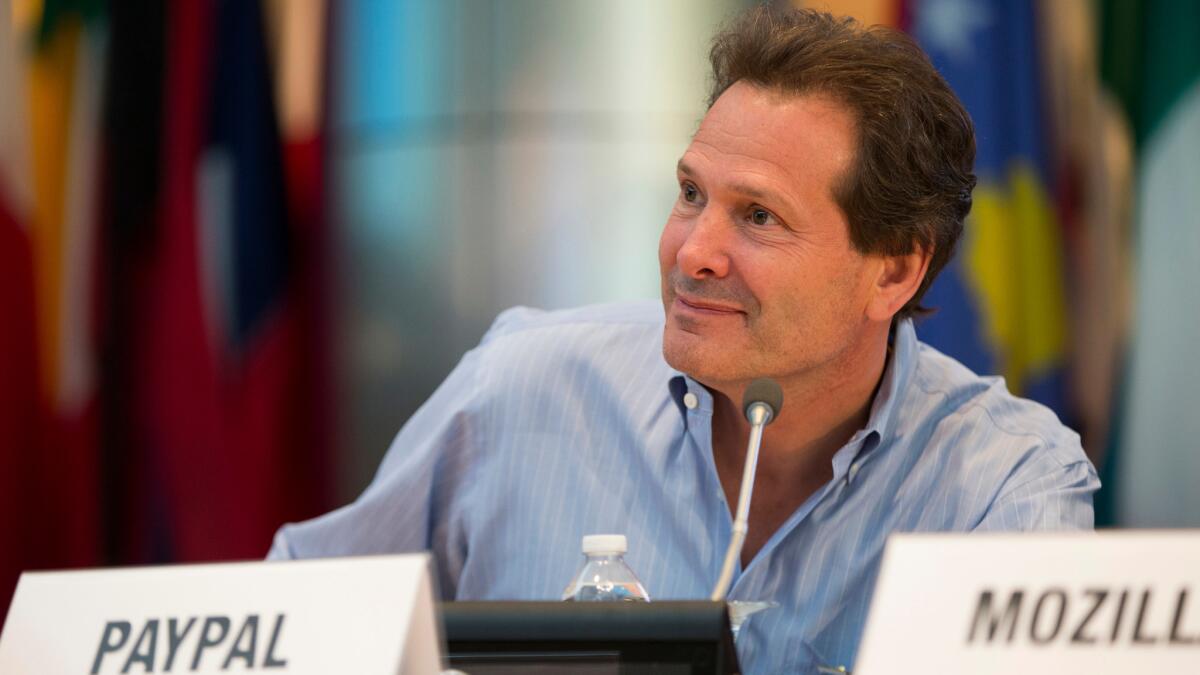Giant companies leaned into making capitalism look cuddly this year

Milton Friedman has had a tough year. The Chicago economist died in 2006, but his legacy lived on in corporate boardrooms.
That changed in 2019 as chief executives lined up to disavow the doctrine that the Nobel laureate popularized in a landmark 1970 essay: that a company’s sole social responsibility is to produce profits for its shareholders.
In its place came a new, cuddlier vision of capitalism, in which stakeholder-friendly CEOs put “purpose” at the heart of their business models; offered their staff mindfulness classes, good coffee and reskilling programs; purged wrongdoing from their supply chains; and stepped up in front of reluctant governments to improve the lot of immigrants, tackle gun violence and save the planet from a warming climate.
“Capitalism as we know it is dead,” Salesforce chief Marc Benioff told a conference in October. A new model of business was taking its place, he said, driven by values, ethics and a desire to take care of employees — not “the Milton Friedman capitalism that is just about making money.”
One researcher called a pledge from nearly 200 CEOs to be more sensitive to others “a clear and pretty heavy-handed attempt” to obscure reality.
Change at the core vs. generous gestures
A decade after a global financial crisis that shattered trust in large companies, the people who run them are keen to recast themselves as constructive social actors.
Their ways of doing so were varied. Some have changed core business practices, such as Royal Dutch Shell investing more in low-carbon energy technologies or Levi Strauss & Co. distressing its jeans with lasers rather than chemicals. Others have made less costly shows of corporate virtue, such as Morgan Stanley and BASF signing a “cool food pledge” to serve “climate-friendly” foods in their cafeterias or Cisco Systems Inc. and Delta Air Lines Inc. backing music festivals to promote the United Nations’ sustainable development goals.
Much of the repositioning has come in the form of letters signed by scores of chief executives. In the last year, the likes of Walt Disney Co. and Goldman Sachs Group Inc. have joined forces with AFL-CIO union leaders to urge the Trump administration to stay in the Paris climate agreement; H&M and Slack Technologies Inc. have been among the companies campaigning to defend women’s access to abortions; and 145 chiefs including the leaders of Uber Technologies Inc. and advertising giant Publicis Group urged U.S. senators to insist that gun buyers undergo background checks.

Companies have also made splashy gestures of generosity toward staffers, such as Citigroup Inc. putting Peloton bikes in its new headquarters gym and PayPal Holdings Inc.’s Dan Schulman promising to raise wages after discovering that 60% of the company’s hourly employees were struggling to make ends meet.
“Dan is the future of American capitalism,” declared Paul Tudor Jones, the hedge fund manager who founded Just Capital, which ranks companies on how they treat stakeholders.
‘Business as usual’ is under threat
Business groups have amplified the message, with the U.S. Chamber of Commerce telling members that “empathy” drives free markets and Britain’s Institute of Directors calling for a more ambitious exploration of “new ways to combine the profit motive with social responsibility.”
Most notably, Washington’s Business Roundtable ditched its long-held allegiance to Friedman-style shareholder primacy.
“That was a profoundly significant moment in the debate,” said Colin Mayer, a professor at Saïd Business School at the University of Oxford. It happened in part, he argues, because CEOs are looking to deter interventions by left-wing politicians such as Sen. Elizabeth Warren and Britain’s Jeremy Corbyn.
“I don’t think you should underestimate the extent to which the corporate community feels under threat,” he said. “There is a real sense that unless they grasp the initiative, it’s going to be grasped by somebody else who’s going to do much more damage.”
John Ruggie, a Harvard professor and human rights expert, agrees that “a defensiveness about the role of the corporation in modern society” has contributed to the rethink.
Veteran Wall Street lawyer Marty Lipton has pointed to another defensive reason for companies to adopt a more stakeholder-friendly stance. “When significant costs to society from climate change and the depletion of resources are tallied, as they will be, an armada of regulators and plaintiffs’ lawyers will appear,” he warned in September.
But companies have also found more positive reasons to embrace their softer side. One is the desire to attract younger employees.
“This generation [has] a desire to understand where their company stands. My generation just thought the best job was the one that paid the most,” said Scott Stephenson, CEO of data analytics company Verisk Analytics Inc.
A clearer financial incentive has come from the boom in environmental, social and governance investing, also known as ESG investing. By the Global Sustainable Investment Alliance’s calculations, funds managing $31 trillion — one-quarter of the world’s total — apply some form of ESG screen to their investments.
The evidence that companies that score well on ESG standards outperform financially is growing, Anne Richards, chief executive of Fidelity International, noted in a recent speech.
As that draws in more investors, companies are positioning themselves to benefit, with Factset spotting a 29% rise in the number referring to ESG on earnings calls between the second and third quarters of this year. Companies including Chevron Corp. and Verizon Communications Inc. have added ESG-related goals to executive compensation schemes.
Is there real change beyond the rhetoric?
The Business Roundtable’s statement also exposed divisions over how much real change will flow from the rhetorical repositioning. Verisk’s Stephenson is among many of its signatories who describe it as a reflection of how their companies already operate rather than a herald of big changes.
Business has not suddenly gone soft, echoed Tom Quaadman of the U.S. Chamber of Commerce. “I don’t think there’s been any fundamental shift,” he said. “Companies have been doing a lot of these things for a long time.”
The status quo looks unlikely to satisfy critics, however. Warren, who is vying for the Democratic presidential nomination, said the Business Roundtable’s statement would be “meaningless” unless it’s followed by changes such as diverting buyback budgets to raise workers’ wages.
Mirza Baig, head of governance at Aviva Investors, noted that there has been no such resetting of financial priorities. “Do we expect buybacks and dividends to be cut? Absolutely not,” he said.
The enthusiasm for a kinder form of capitalism has also emerged in a period of booming profits, raising questions about whether it will survive a downturn. “When things are difficult, does this mean not cutting the headcount because that hurts morale?” Baig asked pointedly.
Having articulated a change in focus, companies now face calls to spell out what this means in practice.
“Purpose, the new mantra for business, that’s pretty fuzzy,” Harvard’s Ruggie said.
“We need to have a conversation on specifics. The ‘motherhood and apple pie’ conversation is nice, but doesn’t get you there,” said Saker Nusseibeh, CEO of Hermes Investment Management.
Unilever CEO Alan Jope has gone further, warning that brands are in danger of “woke-washing” if they make claims of a social purpose they do not live up to.
And for all the more positive headlines this year, there has been no let-up in allegations of antisocial corporate behavior. Even as Alex Gorsky, Johnson & Johnson’s chief, was writing the Business Roundtable’s statement, he was battling litigation over his company’s role in the opioid crisis.
Some executives see a risk of disillusionment if promises of a new model of capitalism are not followed by clear changes in corporate behavior.
“Citizens’ expectations have risen around the world,” said Daryl Brewster, chief of the business coalition Chief Executives for Corporate Purpose. His question for 2020 is: “How do companies really actualize this?”
Others are willing to take that risk. “If expectations have been raised, I think that’s good,” Stephenson said. “I look forward to living and acting in that world of increased expectations.”
© The Financial Times Ltd. 2019. All rights reserved. FT and Financial Times are trademarks of the Financial Times Ltd. Not to be redistributed, copied or modified in any way.
More to Read
Inside the business of entertainment
The Wide Shot brings you news, analysis and insights on everything from streaming wars to production — and what it all means for the future.
You may occasionally receive promotional content from the Los Angeles Times.










